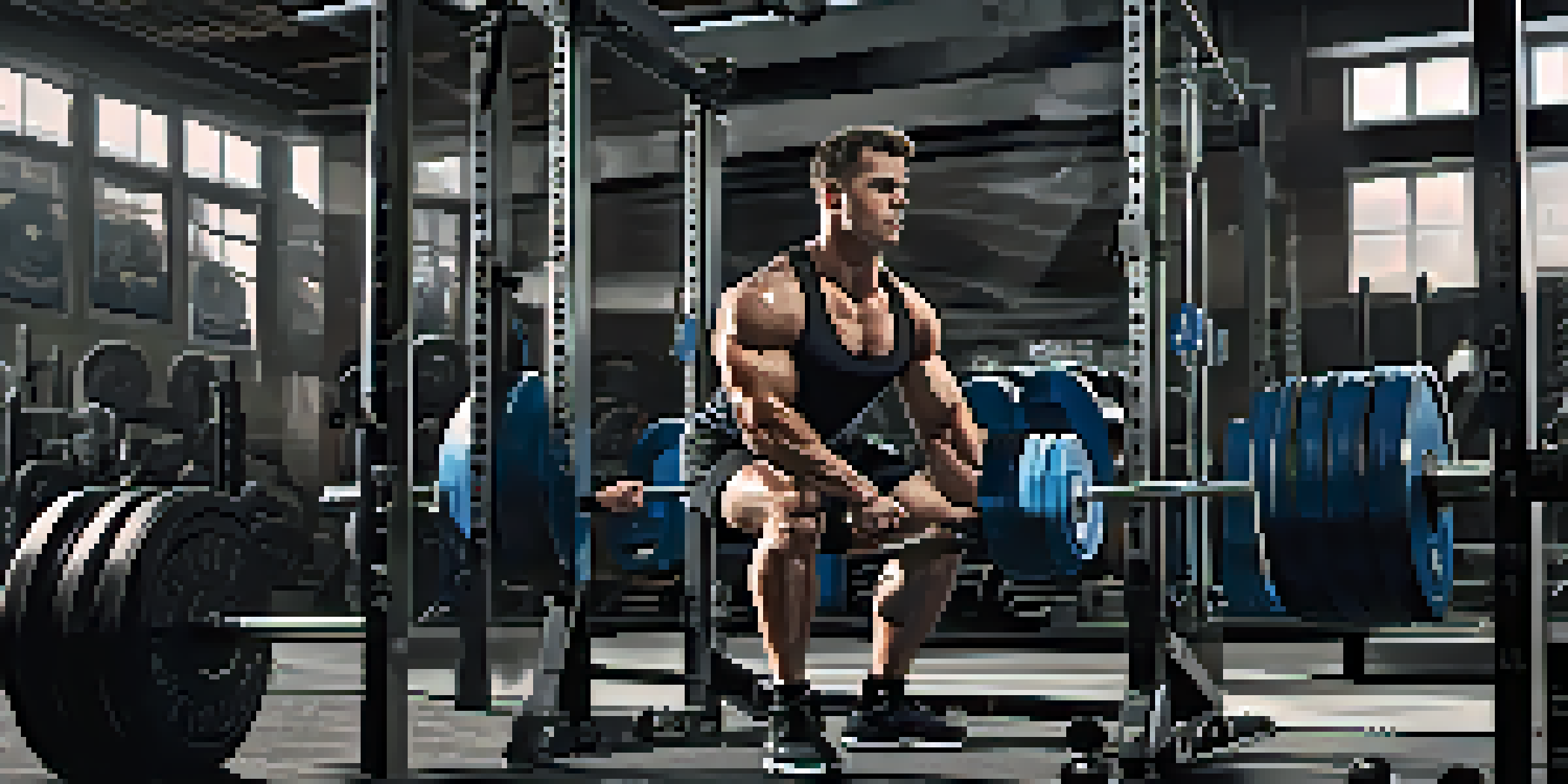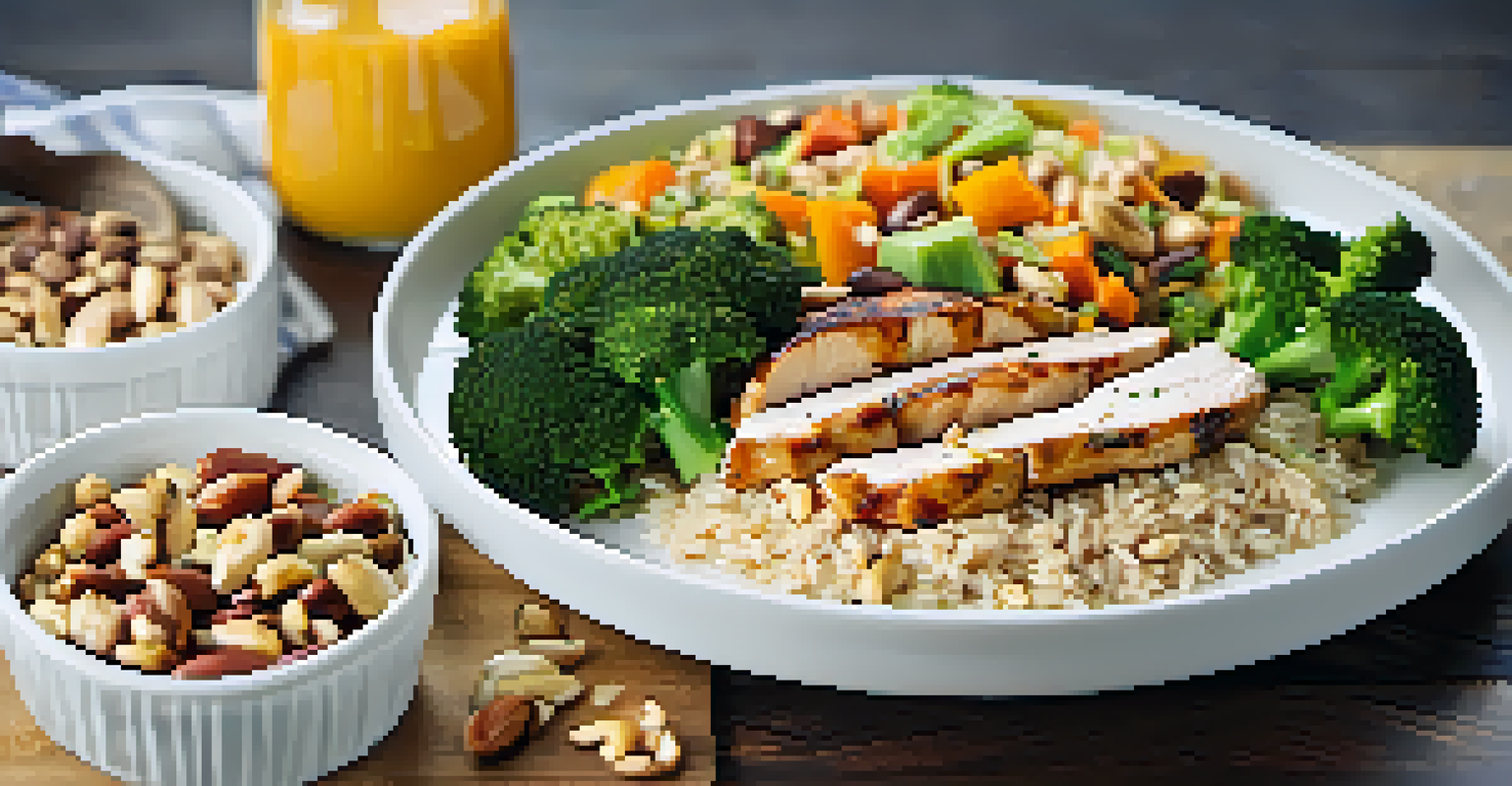The Role of Nutrition in Advanced Powerlifting Techniques

Understanding Powerlifting and Its Demands
Powerlifting is not just about lifting heavy weights; it's a combination of technique, strength, and endurance. The three main lifts—squat, bench press, and deadlift—require not only physical power but also the right approach to training. Each lift engages different muscle groups, and mastering them can lead to impressive gains over time. However, without proper nutrition, these efforts can fall flat, as the body needs fuel to perform at its best.
Nutrition is not just about eating; it's about learning to live.
Imagine your body as a high-performance engine. Just like a car needs high-quality fuel to run smoothly, your muscles require the right nutrients to function efficiently. This is where nutrition plays a pivotal role in maximizing your performance. A well-balanced diet can enhance recovery, improve strength, and increase endurance, making it an essential aspect of any serious lifter's regimen.
Incorporating nutrition into your powerlifting routine means understanding how food impacts your workouts. It’s not just about what you eat, but when and how much you consume. With the right nutritional strategy, you can help ensure that your body is always ready to hit new personal records and tackle the challenges of advanced powerlifting techniques.
Key Nutrients for Powerlifters
When it comes to powerlifting, certain nutrients stand out as crucial for performance. Protein, carbohydrates, and healthy fats form the foundation of a lifter's diet. Protein is vital for muscle repair and growth, while carbohydrates provide the energy needed for those intense lifting sessions. Healthy fats support hormone production and overall health, creating a balanced nutrient profile essential for any athlete.

Think of protein as the building blocks of your muscles. Consuming enough protein ensures that your body can recover efficiently after heavy lifting. Foods like chicken, fish, eggs, and legumes are excellent sources. On the other hand, carbohydrates act as your energy source—think of them as the fuel you need to keep your engine running during workouts. Whole grains, fruits, and vegetables should be your go-to choices to keep energy levels high.
Nutrition Fuels Powerlifting Success
A well-balanced diet rich in protein, carbohydrates, and healthy fats is essential for optimizing performance and recovery in powerlifting.
Don’t overlook healthy fats, which play a vital role in hormone regulation and overall health. Including sources like avocados, nuts, and olive oil in your diet can help maintain optimal hormone levels, which is crucial for muscle growth and recovery. By focusing on these key nutrients, you can ensure that your body has everything it needs to support advanced powerlifting techniques.
The Importance of Meal Timing
Meal timing can significantly impact your performance and recovery in powerlifting. Eating the right foods at the right times can enhance your energy levels before workouts and optimize recovery afterward. For instance, having a balanced meal rich in carbohydrates and protein about 1-2 hours before lifting can give you the energy boost you need during your session. Conversely, a post-workout meal can help replenish energy stores and kickstart recovery.
You can't out-train a bad diet.
Think of meal timing as a strategic game plan. Just like a coach devises a strategy for a game, you need to plan your meals around your training schedule. Consuming a mix of protein and carbs soon after your workout can help your muscles recover and grow stronger. This timing ensures that your body is primed to absorb the nutrients it needs most when it needs them the most.
Additionally, staying consistent with your meal timing can help regulate your metabolism and keep your energy levels stable. This consistency fosters better digestion and absorption of nutrients, which is particularly beneficial when training intensively. By mastering meal timing, you can give your powerlifting journey an extra edge.
Hydration: Fueling Performance and Recovery
Hydration is often an overlooked aspect of nutrition, yet it plays a crucial role in powerlifting performance. Water is essential for almost every bodily function, including regulating body temperature and aiding in nutrient transport. A fully hydrated body can perform at its peak, while dehydration can lead to fatigue, decreased strength, and impaired recovery, making it vital to drink enough fluids before, during, and after training.
Consider hydration as the oil in your engine. Just as oil keeps engine parts moving smoothly, water ensures that your muscles and joints function optimally. A good rule of thumb is to drink water consistently throughout the day, especially before and after workouts. You might also consider electrolyte-rich drinks if you're sweating heavily during intense sessions, as these can help replenish lost minerals.
Meal Timing Enhances Performance
Strategically planning meals around training sessions can significantly boost energy levels and recovery for powerlifters.
Incorporating hydration strategies into your routine can elevate your powerlifting performance. Whether it’s carrying a water bottle during workouts or setting reminders to drink throughout the day, these small changes can lead to significant improvements. By prioritizing hydration, you can help maintain strength and endurance, making it easier to tackle advanced lifting techniques.
Supplements: Enhancing Your Diet
While a well-balanced diet should be your primary source of nutrition, supplements can provide additional benefits for powerlifters. Protein powders, creatine, and branched-chain amino acids (BCAAs) are some popular options that can help support your training goals. However, it’s essential to view supplements as an addition to, not a replacement for, a healthy diet.
Think of supplements as the icing on the cake. They can help fill nutritional gaps and enhance performance but should never substitute for whole foods. For example, protein powders can help you reach your daily protein goals, especially when you're on the go. Creatine is known for boosting strength and power output, making it a favorite among lifters looking to push their limits.
Before adding supplements to your routine, it's a good idea to consult with a healthcare or nutrition professional. They can help you determine what might be beneficial based on your specific goals and dietary needs. By complementing your nutrition with the right supplements, you can give yourself an extra boost on your powerlifting journey.
Listening to Your Body: Individual Nutrition Needs
Every powerlifter is different, and so are their nutritional needs. Factors such as age, weight, training intensity, and individual goals can influence what works best for you. It’s essential to listen to your body and make adjustments to your diet and nutrition plan as needed. What works for one lifter may not yield the same results for another, and that’s okay.
Consider your body as a unique machine that requires specific fuel to operate optimally. You might find that certain foods help you feel energized and strong, while others leave you feeling sluggish. Keeping a food journal can be a helpful tool to track how different foods affect your performance and recovery, allowing you to fine-tune your nutritional strategy.
Hydration is Key for Performance
Staying properly hydrated is crucial for maintaining strength and endurance during powerlifting workouts.
Additionally, don’t hesitate to seek guidance from a nutritionist or dietitian who understands the demands of powerlifting. They can help you create a personalized nutrition plan that aligns with your goals and lifestyle. By being in tune with your body’s needs, you can optimize your nutrition for better performance in your powerlifting journey.
Conclusion: Nutrition as a Cornerstone of Powerlifting
In the world of powerlifting, nutrition is not just an afterthought; it’s a cornerstone of success. From fueling workouts to aiding recovery, the right nutritional approach can make a significant difference in your performance. By focusing on key nutrients, meal timing, hydration, and individual needs, you can enhance your lifting techniques and overall results.
Just like building a strong foundation for a house, establishing a solid nutritional base will support your powerlifting journey. As you implement these strategies, remember that consistency is key. The more committed you are to your nutrition, the better your performance will be in the gym.

Ultimately, powerlifting is a holistic endeavor that encompasses training, mindset, and nutrition. By prioritizing nutrition, you equip yourself with the tools needed to achieve your goals and unlock your full lifting potential.